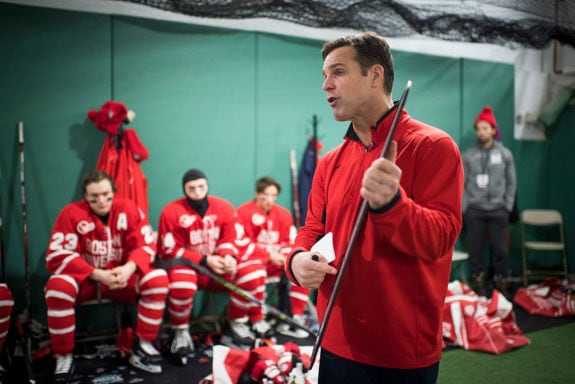![]()
One of the pleasant surprises in the NHL has been the resurgence of the New York Rangers, as it was supposed a transitional season, but the team has been quite competitive in the short sampling of games played. What has been the catalyst for this hockey renaissance? Rangers coach David Quinn has caught the attention of his talented but inexperienced roster by cutting ice time for those players who continually have mental lapses in games.
The tactic is called “tough love,” and while this approach isn’t revolutionary, the Rangers’ new coach has effectively used this teaching tool as he expects his team to play at a high level each night. It’s all part of the learning curve that comes with cultivating young talent. If Quinn doesn’t like what he sees on the ice, then those who lacked the effort were scratched from the next game’s lineup.
Quinn Expects Accountability From His Players
It’s refreshing to see a coach who isn’t afraid to take a bold stance by holding his players accountable for their actions on the ice. Quinn expects the youngsters to play smarter or they will see their ice time diminish. He has no problem putting Pavel Buchnevich, Neal Pionk and Tony DeAngelo in the press box for the evening if it can ignite a spark for them to play up their potential. Even a veteran like Kevin Shattenkirk has been a healthy scratch this season.
Quinn expects his players to attack the offensive zone and refrain from becoming passive with the puck. Too much passing will stagnate all potential scoring chances near the net. Buchnevich, Pionk and DeAngelo are very talented, but each was woefully inconsistent from night-to-night. To remain in the lineup, they have become a more active participant on both ends of the ice.
In the case of Shattenkirk, he had zero points in the games prior to his benching. Quinn’s message was simple to his star player: that he needed to see him play with more confidence and make quicker decisions in moving the puck out of the defensive zone to jump-start the offense.
Patience Is Needed to Develop Young Talent
Developing young talent is never easy as patience is a virtue needed during the entire process. Quinn believes gaining confidence in your own game is the biggest hurdle for any young player to leap over before becoming a regular contributor in the NHL. It’s all about a belief of accountability and maintaining a consistent level of play on each night’s shift.
The players have accepted and responded to Quinn’s coaching philosophy because he’s not changing any part of the style that has brought him to the NHL. His goal is to open a line of communication with his players by challenging them not to rest on past achievements and strive to be their best each night. The Rangers have played with more urgency of late and have reaped the benefits by moving up in the standings.

We’re breathing rarefied air, as most New York sports franchises would tap out before engaging in a full rebuild, given that the mindset of the fans makes it very difficult to wait out the growing pains that come with developing young talent. It’s called a “win-now” mode that sacrifices long-term goals for short-term success, but the end results are rarely fulfilling.
The Rangers have hired the right coach to guide the rebuild of their organization. Quinn has instilled a mindset that rewards those who play hard for 60 minutes each night. The entire roster is engaged and ready to perform as no one is safe in the lineup.
Rookies are trying to identify their role in the lineup, while veterans understand their status with the franchise doesn’t guarantee them quality ice time. Quinn expects his players to correct the mistakes or they can enjoy their evening in the stands.
“Tough love” has been the best approach to rebuilding the Rangers.